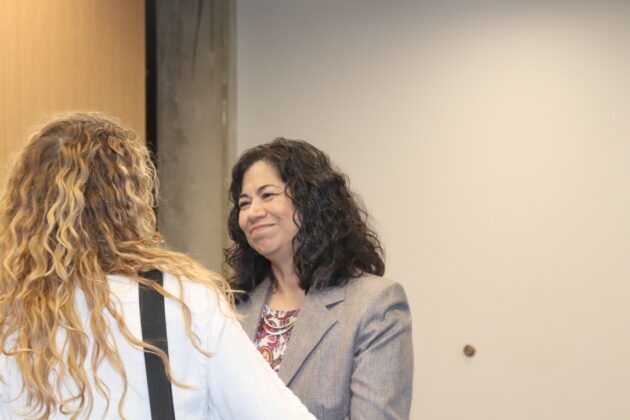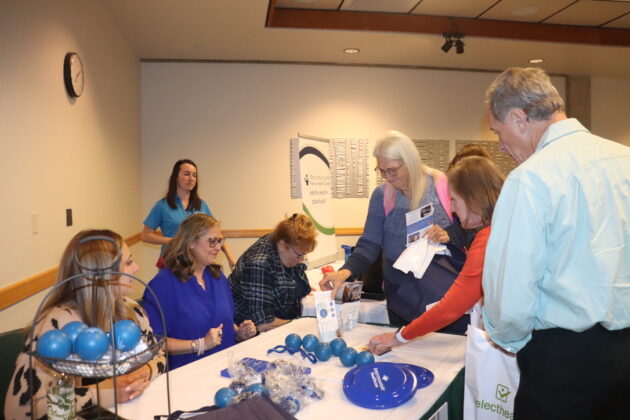This year’s annual Mental Health Services Awareness Night, primarily sponsored by Intermountain Healthcare, featured Reyna I. Aburto, Desmond Lomax and local organizations to inform attendees of resources available in the community on Oct. 20.
The event, hosted by Utah Valley University for the 14th year in a row, consisted of messages from guest speakers and booths with mental health resources from multiple organizations. Among these organizations were Encircle, the Provo and Orem Police Departments, Narcotics Anonymous, BYU CAPS and BYU Comprehensive Clinic.
One of the primary sponsors of the event and CEO of Intermountain Healthcare Kyle Hansen said, “The purpose of the event is to make people in our community aware of all the resources that exist to help with mental health needs.”
The conference was targeted toward church leaders, teachers, parents and anyone who is in a position to guide others — or themselves — toward help, according to Hansen.
Hansen said although the hospital provides great care to those who come to the emergency room in times of crisis, there is much that can be done before they get to that point.
“It’s not one entity. It’s going to take all of us as a community — our organizations, our families, us as individuals, I think — coming together to find lasting solutions,” Hansen said.
Desmond Lomax, a therapist and former member of the Utah Department of Corrections, and Reyna I. Aburto, former second counselor of the General Relief Society Presidency for The Church of Jesus Christ of Latter-day Saints, spoke on how to help others with their mental health challenges.
Aburto talked about her experience helping her daughter through her journey with anxiety and depression and gave several suggestions on what individuals can do to support someone in their mental health journey.
First, she said to ask questions about how they are feeling in order to help them process their emotions. Next, she said to ask them if they have thought about harming themselves or ending their life. While Aburto recognizes that this is difficult to ask, mainly because the answer may be fearsome, she said, “If they have been thinking about that, we want to know. We want them to express all they are feeling.”
Aburto also said individuals need to validate the pain they are feeling regardless of whether or not they understand it.
“You know, I have never broken a bone in my life — I don’t know how that pain feels. But if someone breaks a bone and they tell me that it hurts, I believe them,” she said. “So if somebody’s telling us that they’re broken inside, we need to believe them.”
Finally, Aburto suggested inviting them to action, assisting them in identifying the root cause of their emotions, expanding their circle of support and pointing others to their source of strength.
“I would recommend — if you are a Christian, if you have any other beliefs — to help people go to that root source of their strength. If it is faith, if it is love or family members, bring them to that source so they can be healed,” she said.
Janet Frank, a media manager at Utah Valley Hospital, said there has been a lot of progress in society over the last 14 years.
“I think we’ve seen a progression of more people being willing to talk about it and willing to investigate what’s out there and how they can help people,” she said. “We always get a great response from the organizations that offer resources and we see new organizations come up in our community and they’re addressing maybe a more particular aspect of mental health that hasn’t been addressed before.”
BYU CAPS faculty member Lesli Allen spoke about the services offered to BYU students and what resources are available for those who are in need but on the waitlist.
Allen said that any student in crisis can walk in to their facility and be seen within the hour or call the crisis line to be connected to a crisis counselor after hours. Students who are not at risk of self-harm but are dealing with a triggering event can participate in the QuickCare program which allows them to meet with a counselor once that same week, according to Allen.
If they need more consistent care and are waiting for admission, Allen said there are two phone apps that walk them through modules and exercises, as well as case managers who assist students in finding off-campus therapists in accordance with their insurance. If students struggle with the co-pay, Allen said there is “special money set aside for financial aid” to assist them.
BYU Comprehensive Clinic also attended the event to share the resources they have to offer.
The clinic is more focused on caring for the wider community, although it is open to students as well, according to public relations representative Udim Obot. Obot explained that session costs are drastically cheaper than other community services — $15-30 per session —because the sessions are directed by graduate and doctoral students who are supervised by licensed clinicians.
Aburto emphasized the importance of hope when it comes to dealing with mental health.
“There is not really a magic formula to solve all of the struggles, I think the formula and the way is to keep trying,” she said.










